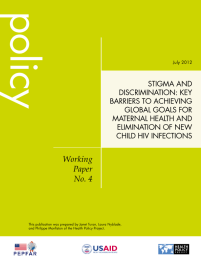The Health Policy Project ended in 2016. Work continued under Health Policy Plus (HP+) until 2022.
PUBLICATION
Author(s): Janet Turan
Primary Language: English
Date: 7/24/2012
Abstract:
Maternal deaths and infant HIV infections continue despite improved regimens for maternal health and prevention of mother-to-child transmission (PMTCT) and increases in PMTCT services. Service uptake and retention drop off significantly at each step in the PMTCT cascade. Key social factors limiting the successful completion of the cascade are stigma and discrimination. The Health Policy Project conducted a comprehensive literature review to examine the current evidence on stigma and discrimination and their negative impact on PMTCT, as well as the potential benefits of integrating PMTCT into antenatal care (ANC) and maternal, neonatal, and child health (MNCH) services.
Substantial evidence indicates that stigma and discrimination affect (1) initial use of ANC services, (2) uptake of HIV testing during ANC, (3) initial participation in programs for PMTCT and HIV care, (4) use of skilled delivery services, (5) adherence to recommended infant feeding practices, (6) participation in early infant diagnosis, and (7) retention in and adherence to these programs during and after pregnancy.
It will be impossible to reduce HIV-related maternal mortality without lowering the barriers of stigma and discrimination. Integrating maternal health and HIV services may not be enough to overcome social barriers that keep women, partners, and infants from fully accessing health services. Alongside important modifications to make clinical services more effective, convenient, and accessible for pregnant women and families; PMTCT, maternal, neonatal, and child health services must address HIV-related stigma and discrimination.
Gender HIV Maternal Health People Living With HIV (PLHIV) Prevention of mother to child transmission of HIV (PMTCT) Report Stigma and Discrimination Working Papers Global


